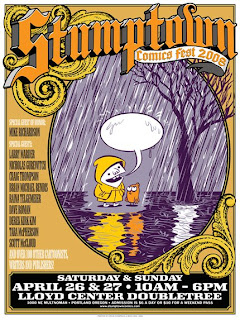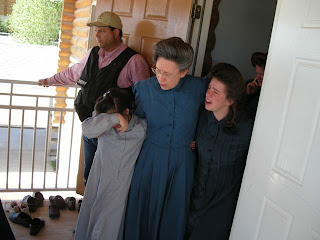 This weekend I attended the Stumtown comics fest in Portland Ore. I have been a graphic novel fanatic for two years, ever since I read Blankets by Craig Thompson. Thompson also happened to be a headlining speaker at this event.
This weekend I attended the Stumtown comics fest in Portland Ore. I have been a graphic novel fanatic for two years, ever since I read Blankets by Craig Thompson. Thompson also happened to be a headlining speaker at this event.
Sunday, April 27, 2008
Stumptown Comics Fest uses social media to enhance the experience
Wednesday, April 23, 2008
Propaganda in an age of transparency

My instructor and social media guru Kelli Matthews recently directed me to a story about how the Fundamentalist Church of Jesus Christ of Latter Day Saints (FLDS) ssupporters responded to the late March raid of the YFZ Ranch in Eldorado, Texas, which ended with 437 children in state protective custody. View the original press release.
Photo from Web site: captivefldschildren.org
FLDS advocates recently posted a Web site, which includes heart wrenching videos and photos clearly designed to tug at the heart strings of visitors. Videos include sobbing little girls being taken away by state officials, who confess to not having a search warrant in another clip.
Watching the videos I can't help but feel manipulated. Seeing pioneer children in tears conjures my childhood associations of Laura Ingalls Wilder. I feel frustrated with the way they are side-stepping the main issue. The Web site does not attempt to defend the FLDS way of life Rather, it frames the story in terms average Americans can relate to, the need to return innocent children to their parents, avoiding the real issue completely.
What would have happened if FLDS had taken a more transparent approach? Instead of insisting that the FLDS does not perform the weddings of underage girls, and the lifestyle is really not different from that of average Americans, the sect could have admitted their lifestyle differences. Then they could have argued that different is not wrong that it does not automatically result in child abuse.
I am not sure if many people would buy this argument, but avoiding the issue completely and producing propaganda will only make people assume that you have something to hide.
Unless the primary purpose of material is to give additional fuel to those who already hold this viewpoint, rather than changing public opinion, the site will be completely ineffective. I do not see a place for propaganda in an age of transparency.
Sunday, April 20, 2008
Ethanol oil subisidies: How do we transform information into action?

Recently, I've noticed increased interest about the effect increased demand for biofuels is having on the global price of food. Since I read the December cover story of The Economist, The End of Cheap Food, I've felt passionate about eliminating corn ethanol subsidies. While I am glad to see the increased coverage, I wonder why it has taken the American media four months to catch on to this story?
I feel the reason is the complexity of the issue. It is difficult to explain to the average person how these subsidies are causing the price of food to rise. When I read The Economist story, one fact stood out: "fill up an SUV's fuel tank with ethanol and you have used enough maize to feed a person for a year."
This is an easy message to digest and understand. Breaking down a complex message into a simple example is a key tenet of public relations, and is a necessary skill. Public relations professionals must not only communicate clear and simple messages, they must also indicate why the issue is important.
Finally, we must compel people to action. This is where I struggle with the ethanol issue. Even if a large group of people actually become familiar with the issue of ethanol oil subsides what action should they take? How can we transform this information into action?
